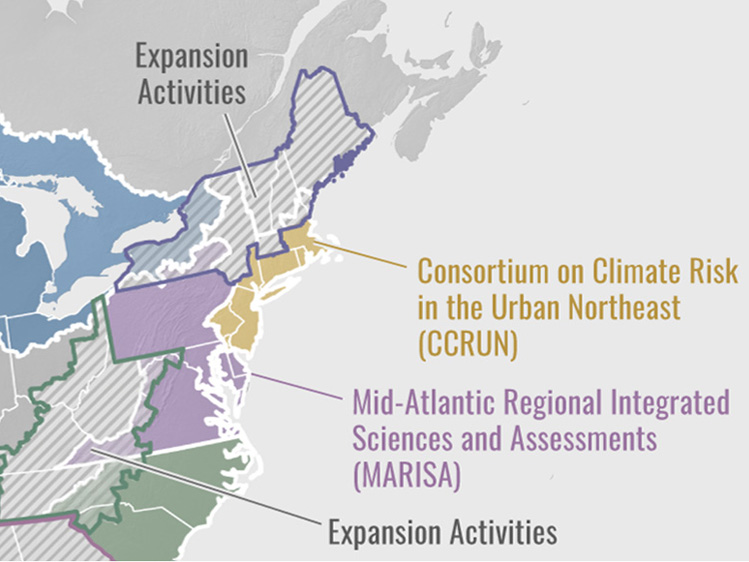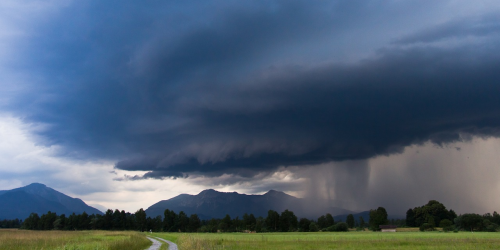CPO’s Climate Adaptation Partnerships program, formerly the Regional Integrated Sciences and Assessments (RISA) program, is announcing three new 1-year activity projects in Fiscal Year 2022 (FY22). The award funds multi-collaborator workshops or other innovative planning activities in the subregions of the Upper Northeast (Maine, New Hampshire, Vermont, western Massachusetts, and Upstate New York) and Appalachia (West Virginia, eastern Kentucky, eastern Tennessee, and mountain areas of western North Carolina, western Virginia, and southern Ohio). These activities will identify and examine important issues in the regions related to social and economic dimensions of climate variability and change. The competitively selected projects total $279,317 in cooperative agreements1.


Collaborative planning activities support new resilience and adaptive capacity engagement in regions of the U.S. where regional teams do not operate or have a light footprint. These activities support preliminary trust-building activities between partners and scoping activities for future collaboration across a variety of relevant topics at the intersection of socioeconomic and climatic stressors. Each project will produce a white paper highlighting regional needs as well as adaptation challenges and opportunities. This information will provide context for scoping new CAP/RISA competitions.
A central tenet of the CAP/RISA program is that learning about climate adaptation and resilience is facilitated by and sustained across a wide range of experts, practitioners, and the public. Learning about and doing adaptation happens within social contexts. As such, the CAP/RISA program supports networks of people working together to plan for and adjust to change using science and local knowledge.
All CAP/RISA collaborative planning activities incorporate the principles of justice, equity, diversity, and inclusion into team composition, team management and decision-making, focal areas for research and engagement, geographies of practice, and in the approaches employed. CAP/RISA is a covered program under the White House Justice 40 Initiative.
The 3 new projects2 funded by the CAP/RISA program in FY22 are:
- Building Resilience to Climate Change Driven Extreme Weather Events in Appalachia
This effort proposes two projects to guide co-creation of visions of Appalachian resilience: Project 1: Community Connections Through a Health Department Collaborative, and Project 2: Learning from Exemplar Communities. The goals of this planning effort are to: a) build and strengthen regional partnerships between researchers, health departments, and community leaders; b) initiate a collaborative network of Central Appalachian health departments to co-create a shared vision of climate impacts and resilience needs; and c) to learn from and share regional “bright spots”, i.e. exemplar communities leading existing forward-focused resilience efforts, in order to create inspiration, discussion, and broader regional networks. In Project 1, the research team will reach underrepresented populations by partnering with local health departments (LHDs), which meet a variety of related needs related to water, wastewater, flooding, heat, housing, and health. The team proposes to develop a health department collaborative to facilitate long-term relationships and creative solutions through deployment of a survey to identify common themes, online listening sessions, support of resilience-building efforts proposed by community partners, and an event to translate the results to stakeholders. In Project 2, the team will elevate success stories of exemplary communities to create broader conversations and spur further innovation. Both Projects 1 and 2 will create living documents to support an ongoing regional conversation.- Co-Lead PIs:
- Dr. Natalie Kruse Daniels, Ohio University
- Dr. Leigh-Anne Krometis, University of Virginia
- Dr. Emily Garner, West Virginia University
- Co-PIs:
- Dr. Jamie Shinn, West Virginia University
- Dr. Danny Twilley, West Virginia University
- Dr. Cully Hession, University of Virginia
- Dr. Kathy Hosig, University of Virginia
- Dr. Michele Morrone, Ohio University
- Dr. Harold Perkins, Ohio University
- Dr. Amy Chadwick, Ohio University
- Dr. Amy Lynch, Ohio University
- Dr. Tiffany Arnold, Ohio University
- Dr. Geoff Dabelko, Ohio University
- Co-Lead PIs:
- A Northeast Safe and Thriving for All (NEST)
This project will review the extent to which climate adaptation research, policy, plans, and projects in the Northeast region address central concerns of equity and justice under climate migration. Additionally, this project will bring together existing subregional networks in the Vermont and New Hampshire Upper Valley, Coastal Maine and New Hampshire, and Rustbelt cities in Upstate New York. Subregional convenings will surface (a) how race, class, urban/rural status, and other identity divides shape beliefs and reactions to planning efforts for adaptation and climate migration; (b) how governance and capacity deficits impede planning and implementation and how these constraints may be addressed; and (c) which entities should be centered in a regional adaptation network that takes in-migration seriously. Lastly, the research team will partner with Antioch University, which hosts the biannual New England Local Solutions Conference on climate preparedness and resilience, to focus the 2023 event on climate migration. The final report resulting from these efforts will draw on these three components to identify gaps in research, policy, and practice for equitable and just development under climate migration; opportunities to change engagement approaches and governance networks in response to these gaps; and a path towards building a regional adaptation network that would embrace the climate migration challenge, which would be central to a future NOAA Upper Northeast CAP/RISA.- Lead PI: Dr. Linda Shi, Cornell University
- Co-PIs:
- Dr. Abigail Abrash Walton, Antioch University New England; Director, Center for Climate Preparedness and Community Resilience
- Dr. Shorna Allred, Professor, Cornell Department of Natural Resources and the Environment
- Dr. Casey Brown, Professor, University of Massachusetts-Amherst Department of Civil and Environmental Engineering
- Dr. Christa Daniels, Faculty, Antioch University New England; Senior Associate, Center for Climate Preparedness and Community Resilience
- Dr. David Hart, Director, Mitchell Center for Sustainability Solutions, University of Maine
- Dr. Vanessa Levesque, Assistant Professor, Department of Environmental Science and Policy, University of Southern Maine
- Dr. Matthew Hauer, Assistant Professor, Department of Sociology, Florida State University
- Dr. Susanne Moser, Director and Principal Researcher of Susanne Moser Research & Consulting; Affiliated/Research Faculty at University of Massachusetts-Amherst and Antioch University
- Dr. Erich Osterberg, Associate Professor, Dartmouth Earth Sciences; Chair of Upper Valley Climate Adaptation Workgroup
- Ms. Julia Peterson, Full Extension State Specialist/Professor, University of New Hampshire Cooperative Extension/NH Sea Grant
- Dr. David Reidmiller, Climate Center Director, Gulf of Maine Research Institute
- Dr. Scott Steinschneider, Assistant Professor, Cornell Department of Biological and Environmental Engineering
- Dr. Cameron Wake, Josephine A. Lamprey Professor in Climate and Sustainability, University of New Hampshire Sustainability Institute; Chair of Kittery, Maine, Climate Adaptation Working Group, Member of New Hampshire Climate Adaptation Workgroup
- Dr. Russell Weaver, Director of Research, Cornell University Industrial Labor Relations Buffalo Co-Lab
- Ms. Lisa Wise, Climate Adaptation Program Manager, University of New Hampshire Cooperative Extension/NH Sea Grant
- Collaborating Towards Increased Climate Resilience and Adaptation for Mobile Home Park Communities in Maine, New Hampshire, and Vermont
This project will explore the climate-related vulnerabilities of mobile home park frontline communities. Past work in the state of Vermont serves as the basis for deeper, user-inspired research to be co-produced with park residents. The research team will convene in-person stakeholder meetings (one in each state with the option for virtual attendance) in Maine, New Hampshire, and Vermont to build relationships that will support climate resilience efforts with mobile home park frontline communities. A final cross-state meeting of all key stakeholders will be held in a virtual format to discuss commonalities across each state and to develop an action roadmap for future collaboration and information sharing.- Lead-PI: Dr. Sean Birkel, Cooperative Extension & Climate Change Institute, University of Maine
- Co-PIs:
- Dr. Mary D. Lemcke-Stampone, Department of Geography, University of New Hampshire
- Dr. Lesley-AnnDupigny-Giroux, Department of Geography, University of Vermont
- Dr. Daniel Baker, Department of Community Development & Applied Economics, University of Vermont
- Kelly A. Hamshaw, Department of Community Development & Applied Economics, University of Vermont
1The funding will be distributed over the life of the projects and future-year funding is conditional on appropriations.
2 At the time of publication, all awards may not have been accepted by recipient institutions





